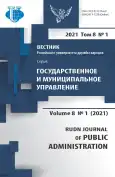Collaborative Governance for Poverty Alleviation: A Systematic Mapping Study
- Autores: Muslim M.A.1, Prasojo E.1, Jannah L.M.1
-
Afiliações:
- University of Indonesia
- Edição: Volume 8, Nº 1 (2021)
- Páginas: 20-36
- Seção: Public administration: theory and practice
- URL: https://journal-vniispk.ru/2312-8313/article/view/317648
- DOI: https://doi.org/10.22363/2312-8313-2021-8-1-20-36
- ID: 317648
Citar
Texto integral
Resumo
The study of poverty reduction is very relevant in the 21st century. The rapid development of technology has proven to improve various quality of life but has not been able to solve the problem of poverty in a total scale. On the other hand, the development of public administration science, especially regarding collaborative governance, provides hope for poverty reduction through the active role of various parties. Many experts explain that poverty is a complex problem. Poverty reduction efforts must be carried out in a holistic and participatory manner. Furthermore, there needs to be an active contribution from various parties, namely the government, the private sector and the community. This requires researchers to conduct further studies on how Collaborative Governance can be an alternative solution to solving the problem of poverty. This study aims to delineate the development of Collaborative Governance studies through the Systematic Mapping Study and associate it to the poverty alleviation to obtain the current research position. The study shows that research on Collaborative Governance for Poverty Reduction is included in Social Issues in Community concentration and it has the lowest percentage. The most widely used method in the research concentrated on Collaborative Governance is qualitative, and the publication trend shows a very significant development, especially in 2014-2018. Therefore, research on collaborative governance for poverty alleviation is still very limited and the opportunity to produce variety of renewals is very large.
Palavras-chave
Sobre autores
Muh Muslim
University of Indonesia
Autor responsável pela correspondência
Email: muhazismuslim01@gmail.com
ORCID ID: 0000-0001-8768-9100
M.Sс., Doctoral Student and Lecturer of Faculty of Administrative Science
Jl. Salemba Raya No. 4, RW. 5, Jakarta, Indonesia, 10430Eko Prasojo
University of Indonesia
Email: prasojo1@ui.ac.id
ORCID ID: 0000-0002-3904-0814
D.Sc., Professor and Dean of the Faculty of Administrative Science
Jl. Salemba Raya No. 4, RW. 5, Jakarta, Indonesia, 10430Lina Jannah
University of Indonesia
Email: miftahul@ui.ac.id
ORCID ID: 0000-0002-0827-0369
D.Sc., Head of Academic Quality Assurance and Lecturer of the Faculty of Administrative Science
Jl. Salemba Raya No. 4, RW. 5, Jakarta, Indonesia, 10430Bibliografia
- Martin K.D., Hill R.P. Life Satisfaction, Self-Determination, and Consumption Adequacy at the Bottom of the Pyramid. Journal of Consumer Research. 2012; 38(6): 1155-68.
- Blocker C.P. Understanding Poverty and Promoting Poverty Alleviation through Transformative Consumer Research. Journal of Business Research. 2013; 66: 1195-1202.
- World Development Report 2009: Agriculture for Development. World Bank. Washington: World Bank; 2008.
- Larantika A. Collaboration as a Strategy for Poverty Alleviation. International Journal of Social Sciences and Humanities. 2017; 1(3): 40-48.
- World Development Report 2005: A Better Investment Climate for Everyone. World Bank. Washington: World Bank; 2005.
- Sen A. Development as Freedom. Oxford University Press; 1999.
- Florini A., Pauli M. Collaborative Governance for the Sustainable Development Goals. Asia Pac Policy Stud. 2018; 5: 583-598.
- World Development Report 2018: Education. World Bank. Washington: World Bank; 2018.
- Booher D.E. Collaborative Governance Practices and Democracy. National Civic Review. 2005; 93(4): 32-46
- Mattessich P.W., Murray-Close M., Monsey B.R. Collaboration: What Makes It Work. 2nd ed. St. Paul. MN: Amherst H. Wilder Foundation; 2001.
- Donahue J. On Collaborative Governance. Corporate Social Responsibility Initiative. Working Paper No. 2. Harvard University; 2004.
- Emerson K., Nabatchi T., Balogh S. An Integrative Framework for Collaborative Governance. Journal of Administration Research and Theory. 2012; 1(22): 1-29.
- Purdy J.M. A Framework for Assessing Power in Collaborative Governance Processes. Public Administrative Review. 2012; 72(3): 409-417.
- McDougall C. Engaging Women and The Poor: Adaptive Collaborative Governance of Community Forests in Nepal. Agriculture and Human Values. 2013; 30: 569-585.
- Ansell C., Gash A. Collaborative Governance in Theory and Practice. Journal of Public Administration Research and Theory (JPART). 2007; 18: 543-571.
- Gupta S.P. Structural Dimensions of Poverty in India. Delhi: Mittal Publications; 1987.
- Suparlan P. Kemiskinan di Perkotaan. Jakarta: Sinar Harapan dan Yayasan Obor Indonesia; 1984 (In Indon.).
- Gilarso Pengantar Ilmu Ekonomi Makro. Yogyakarta: Kanisius; 2004 (In Indon.).
- Chamsyah B. Teologi Penanggulangan Kemiskinan. Jakarta: PT Gramedia; 2006 (In Indon.).
- Marianti R., Wawan M. Moving Out of Poverty: The Case of Desa Branta Pesisir, Kabupaten Pamekasan. Smeru Research Institute; 2006 (In Indon.).
- Stamboel K.A. Panggilan Keberpihakan Strategi Mengakhiri Kemiskinan di Indonesia. Jakarta: PT Gramedia; 2012 (In Indon.).
- Kessy F.L., Arne T. Out of Poverty: Comparative Poverty Reduction Strategies in Eastern and Southern Africa. Dar es Salaam: Mkuki na Nyota Publishers Ltd; 2008.
- Esmara H. Perencanaan dan Pembangunan di Indonesia. Jakarta: Gramedia; 1986 (In Indon.).
- Chalid M. Pelaporan Zakat Pengurang Pajak Penghasilan. Jakarta: Raja Grafindo; 2006 (In Indon.).
- Sumodiningrat G. Mewujudkan Kesejahteraan Bangsa: Menanggulangi Kemiskinan dengan Prinsip Pemberdayaan Masyarakat. Jakarta: Penerbit Buku Kompas; 2009 (In Indon.).
- Kitchenham B., Charters S. Guidelines for Performing Systematic Literature Reviews in Software Engineering. Technical Report EBSE-2007-01. Keele University; 2007.
- Petersen K. et al. Systematic Mapping Studies in software engineering. 12th International Conference on Evaluation and Assessment in Software Engineering. 2008; 17: 68-77.
- Kitchenham B.A., Dyba T., Jorgensen M. Evidence-based Software Engineering. Software Engineering, 2004. ICSE 2004. Proceedings. 26th International Conference. 2004: 273-281.
- Banaeianjahromi N., Kähkönen T., Alanne A., Smolander K. Integration Obstacles during ERP Development. 2016 49th Hawaii International Conference on System Sciences (HICSS). 2016: 4697-4706.
- Musianto L. Perbedaan pendekatan kuantitatif dan pendekatan kualitatif dalam metode penelitian. Jurnal Manajemen & Kewirausahaan. 2002; 4(2). DOI: https://doi.org/ 10.9744/jmk.4.2.pp.%20123-136 (In Indon.).
Arquivos suplementares










